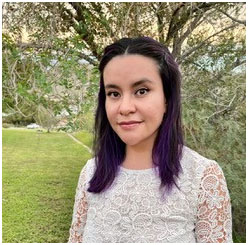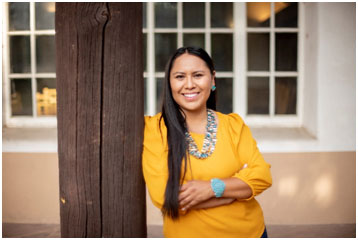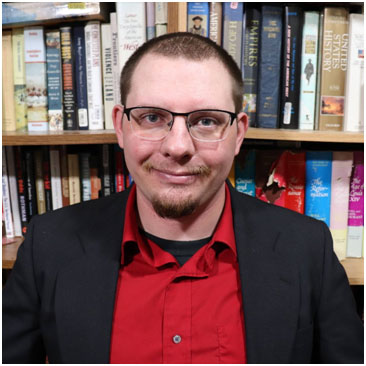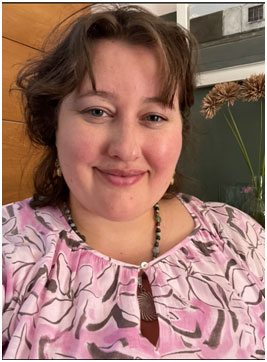2022 Bilinski Foundation Fellowship Recipients
Tania Balderas

Resistance Narrative: Storytelling of Comparative Transnational Insurgencies in Mexico, US, and Haiti
Tania Libertad Balderas is a Ph.D. Candidate in the Department of English Language and Literature. Her fields of study are 20th Century Comparative Literature, centering on American, Latin American, Francophone Caribbean, Chicanx, and Native American Literature. She specializes in Marxism, feminism, anti-imperialism, and decolonial theories. Her dissertation explores the narratives of resistance from three liberation movements of the 1960s and 70s in the US and Greater Mexico: the American Indian Movement (AIM), the Chicano/a Movement, and the Dirty War in the Mexican American borderlands. By analyzing novels, autobiographies, plays, as well as oral histories of the participants of these social movements, her work traces the interrelationship between the testimonies of state repression, the articulation of the social movements’ notions of self-determination, women’s liberation, and the existence of solidarity networks established in their struggle for liberation. By emphasizing the role of feminized and communal labor, her work examines how these narratives function as sites of resistance by reimagining the oral storytelling traditions of their nations into literary forms.
Alana Bock

The Haunting Aesthetics of Empire: Filipinx America, US Empire, and Cultural Production
Alana J. Bock is a Doctoral candidate in the American Studies department and Women, Gender, and Sexuality Studies certificate program at UNM, as well as a recipient of the Glenda Lewis Critical Race Scholarship. Her dissertation, The Haunting Aesthetics of Empire: Filipinx America, US Empire, and Cultural Production, looks at the ways US empire haunts Filipinx America through a violent aesthetics, as well as how Filipinx American cultural production contests and challenges this haunting. Alana has published in the Journal of Asian American Studies, Alon: Journal for Filipinx American and Diasporic Studies, Feminist Formations, and the anthology Filipinx American Studies: Reckoning, Reclamation, Transformation. Since 2019, she has served on the board of the Feminist Research Institute at UNM. Alana is also proud to serve as an elected member of the United Grad Workers union (UE 1466) Bargaining Committee.
Sunnie Clahchischiligi

The Value of Storytelling Through Digital Family Narratives: A Case Study of a Diné Storyteller
Sunnie R. Clahchischiligi is a Diné PhD candidate in Rhetoric and Writing in the Department of English at UNM. Her clans are Tł’íziłání, To’aheedliíínii, Áshįįhí, and Bit’ahnii. Her research interests include storytelling as pedagogy, multimodal composition, Diné /Indigenous rhetoric, critical culturally sustaining/revitalizing pedagogy, and Indigenizing composition pedagogy. Sunnie’s Diné upbringing informs her scholarly work and interests in centering Indigenous thought and knowledge in academia. Her dissertation explores the use of digital storytelling to encourage Diné students and Diné teachers to develop critical consciousness by learning about their histories, communities, and self, and helping Diné students explore their identities and sustain their culture while sharpening their rhetoric skills. She is also a multi-award-winning journalist and fifth generation Diné rug weaver from Teec Nos Pos, Arizona.
Cara Greene

Bloody Rationality: The Dialectic of Modern Reason and Sacrifice in Hegel and the Frankfurt School
Cara is a PhD candidate in Philosophy. Her areas of academic focus are 19th and 20th Century Continental Philosophy, Critical Theory, Psychoanalysis, and Phenomenology. Her dissertation, “Bloody Rationality: The Dialectic of Modern Reason and Sacrifice in Hegel and the Frankfurt School,” retroactively locates a theory of modern sacrifice in Hegel and the Frankfurt School by way of their critiques of modern reason. Both traditions claim that the paradigm of modern science and morality, characterized by the abstraction of universal concepts from the manifold of empirical reality, is materially expressed via the real destruction of individuals. As such, modern reason isn’t confined to the mind: it shows up in the world via real bloodshed.
Joseph Hall-Patton

Vestiges of Violence: Incorporating the Southwest, 1848-1919
Joseph Hall-Patton began his interest in American violence after having served as a soldier in Afghanistan. He returned and got his BA from UNLV and MA from Cal Poly, San Luis Obispo. Having grown up in the Southwest with scholars for parents, he chose to study the history of that region. In 2013, he created a YouTube channel called "The Cynical Historian," where he explores a number of topics for a massive audience, lending him an interest in public history. His dissertation will cover the history of American violence in the Southwest.
Emma Mincks

Affective Orality: Teeth and the Commodity of Character in Eighteenth and Nineteenth Century Social, Medical, and Literary Exchanges 1770-1900s
Emma B. Mincks is a PhD candidate and activist-scholar in British and Irish Literary Studies who researches discourse patterns surrounding land and embodiment through what they term “affective orality.” Emma’s dissertation project applies archival and auto-ethnographic contextualization of fiction, poetry, medical and agricultural documents, and serial publications from the eighteenth and nineteenth century, primarily between 1770-1900, to understand how land enclosure and the material realities of industrial capitalism changed the meanings and “use value” of teeth and oral space within these land/body discourses. Their work highlights perspectives of Indigenous travelers to 19th century Ireland, Scotland, and England and reception of American people to Romantic and Victorian literature. Emma ties their historical research of capitalism and colonialism to ongoing extractivism in Northern Irish and Lakota environmental organizing contexts.
Andrej Radic

How Power Affects Power: Energy and Electricity in the Socialist Republic of Croatia from 1965-1991
Andrej Radic is a PhD candidate in history at UNM. His dissertation titled "Insecure Times: Examining the Effect of Economic Security and Income Inequality on Stability in Croatia 1965-1991" investigates the impact of economic growth (or the lack thereof) and income inequality on state stability, specifically that of the Socialist Republic of Croatia and the Socialist Federal Republic of Yugoslavia in the latter half of the cold war. Through investigating the effects of the economy and income on state stability his dissertation argues that it is possible to uncover a more comprehensive picture of state dissolution in the Balkans.



